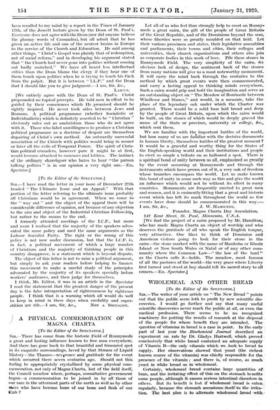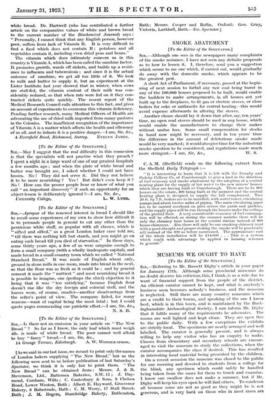WHOLEMEAL AND OTHER BREAD
[To the Editor of the SPECTATOR] SIR,—The -writer of your article on " The.New Bread " points out that the public seem loth to profit by -new scientific dis- coveries. I would go further and say that many useful scientific discoveries -never reach the public at - all, or even the medical ;profession. There seems to be no .recognized machinery for :putting the -results of research at the -disposal of the people for whose :benefit they are intended. The question :of idtamins inbreed is-.a ease in point. 1n:the early part of .last year the :Biochemical Journal described an s experiment :on rats ..,by Dr. Gladys .Hartwell, .Which proved conclusively that white bread contained an adequate supply of Vitamin .B—the only vitamin:which we .look to bread to supply. Her observations :showed that yeast (the ',richest known .source of the :vitamin) -was'chiefly responsible for the , presence of :the vitamin ; and there is, of course, as much yeast in white tread -as in Wholemeal.
Certainly, -wholemeal .bread contains -large quantities of'. bran, and the irritating effect of this . on the :stomach benefits . some ,people, although it -causes serious intestinal s disorders In others. But its benefit is lost if wholemeal bread is eaten regularly, because the stomaCh accustoms itself to .the irrita- tion. The best plan is to .alternate wholemeal .bread ,with
white bread. Dr. Hartwell (who has contributed a further article on the comparative values of white and brown bread to the current number of the Biochemical Journal) says : " Personally, I cannot think that any English person, however poor, suffers• from lack of Vitamin B. It is very difficult to find a food which does not contain B ; potatoes and all vegetables contain it, including even dried peas and beans."
The vitamin which does intimately concern us in this country is Vitamin A, which has been called the sunshine factor. It promotes growth, wards off rickets, and builds up a resist- ance to influenza and tuberculosis•; and since it is the actual outcome of sunshine, we get all• too little of it. We look to milk and butter to supply it, but an experiment at the Lister Institute last year showed that in winter, when cows are stall-fed, the vitamin content of their milk was con- siderably reduced, so that when rats were fed on it they con- tracted rickets quite quickly. The recent report of the Medical Research Council calls attention to this fact, and gives an account of experiments to overcome this vitamin deficiency. Pending further research, many Medical Officers of Health are advocating the use of dried milk imported from sunny pastures in the Colonies. The insufficient recognition of the importance of Vitamin A is a matter which affects the health and efficiency of us all, and to infants it is a positive danger.—I- am, Sir, &c.,
4 Eversfield Road, Richmond, Surrey. EVELYN JAMES.















































 Previous page
Previous page